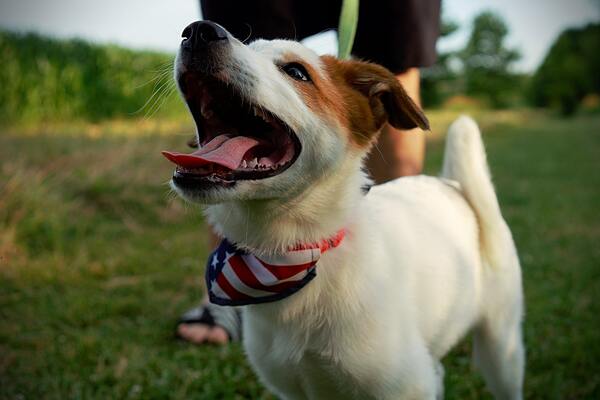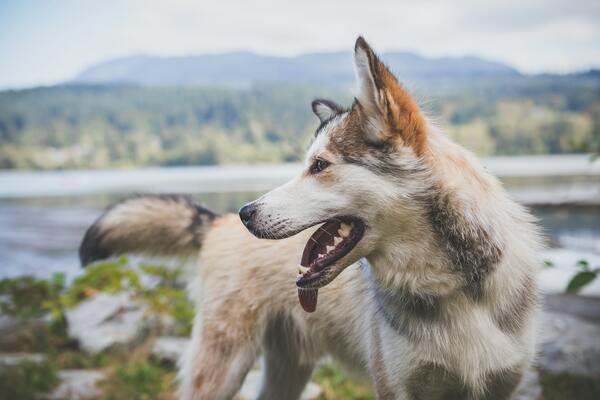Although it may appear that your dog is panting without cause, panting is a typical dog behavior that always has a reason. It’s common for dogs to pant, particularly when they’re hot, ecstatic, or active. To be on the lookout for is panting, though. It’s a helpful indicator of how your puppy is feeling. Let’s talk about why your puppy is panting so much.
What Is Puppy Panting
Normal dog and puppy behavior includes moderate to rapid open-mouthed respiration, which lowers body temperature and introduces oxygen to the dog’s bloodstream. The mouth is open and the tongue is slightly protruding as the panting dog breathes.
Dogs lack an efficient system of sweat glands as people do, so panting is required as a cooling mechanism.
Dogs, on the other hand, use the evaporation of saliva and tongue moisture as well as the exchange of hot air from their lungs with cooler outside air to cool their bodies.
Not to be confused with labored breathing is panting. Labored breathing is characterized by strained respiration and may be accompanied by sounds of distress such as crying or whining, or whistles from the nostrils or windpipe as a result of obstruction.
Why Dogs Pant Heavily
Being Too Warm
Being warm is the most frequent reason people pant. When it’s hot outside, dogs can maintain a normal body temperature by panting, which is a natural and efficient mechanism. The evaporation of moisture from the tongue and mouth permits heat loss.
In comparison to adult dogs, puppies are less adept at controlling their body temperatures. They are consequently more prone to overheating or underheating.
While keeping your puppy warm is important, you also want to make sure they aren’t overheating. Depending on how they are feeling, puppies will typically move around to find warmer or cooler areas, so make sure he has access to a cool area.

Heatstroke Or Poisoning
After exertion, a dog’s breathing may become more rapid or it may begin to pant. Additionally, due to their short snouts, some dogs, such as Boston terriers, bulldogs, and pugs, have heavier breathing tendencies than other breeds.
Heavy panting, however, can also be an indication that a dog has toxic poisoning or is experiencing heatstroke.
Take your dog to the vet right away if you can’t identify an obvious cause for a sudden change in their breathing. Follow the instructions at the end of this article to help cool your dog safely if you suspect heatstroke.
Chronic Illness
Heavy breathing or panting in dogs may be caused by conditions like heart failure, Cushing’s syndrome, or respiratory disorders:
- Heart failure: Dogs can experience heart failure just like humans do. And just like people, dogs may exhibit some of the same symptoms, such as coughing, difficulty breathing, and decreased exercise tolerance. Depending on the cause, the treatment for your dog’s heart failure will vary. However, a doctor may prescribe medications like ACE inhibitors and diuretics as part of the treatment.
- Cushing’s syndrome. When a dog’s adrenal glands overproduce cortisol, this happens. A pot-bellied appearance, excessive thirst and urination, excessive hunger, and heavy panting are additional symptoms that may be present. Surgery or drugs that suppress the adrenal glands may be used as treatments, depending on the case.
- Respiratory disorders. Heavy breathing or panting can result from a number of respiratory conditions, including laryngeal paralysis, pneumonia, and lung tumors. The course of treatment is determined by the condition and how far it has advanced.
Injury And Pain
When they are in pain, dogs cannot verbally communicate that to us. We must therefore be aware of what to look for. One sign that your dog may have sustained an injury is heavy panting.
Pets may also exhibit other symptoms of pain or trauma, such as enlarging their pupils, losing their appetite, refusing to lay down, being restless or anxious, or licking or biting the area of pain.
Dogs may conceal their suffering by acting normally, like wagging their tail. Additionally, an injury may be internal, such as from being hit by a car. Therefore, act quickly if you think your pet is in pain. Immediately seek veterinary care.
Medication
Heavy panting in dogs is another side effect of some drugs, including prednisone. If you believe that your dog’s medication is resulting in excessive panting, consult your veterinarian.
Other Causes Of Heavy Panting In Dogs
Eclampsia, also known as milk fever, can cause heavy breathing or prolonged, intense panting.
Eclampsia, a dangerous condition that affects nursing mothers, causes tremors, the inability to stand or walk, and low blood calcium levels. In addition, dogs may have noisy, wheezy breathing due to allergies, infections, or irritation of the airways.
Any unexplained change in your dog’s breathing, whether it be heavy panting, coughing, or wheezing, warrants a call to your veterinarian regardless of the type of breathing your dog typically exhibits.
When To See A Vet
It’s important to keep in mind that dogs typically pant after exercise, excitement, or in warm weather.
If any of the following hold true, call your veterinarian right away:
- The panting of your dog begins abruptly.
- Your dog seems to like it might be in pain.
- The panting is continuous and loud.
- A sign that your dog isn’t getting enough oxygen is when his tongue or gums turn blue, purple, or white.
Normal Puppy Panting
In most cases, a puppy will pant for the same reasons an adult dog would. Typically, dogs pant as a means of cooling themselves because they can’t sweat through their skin as humans do. Exercise or hot, humid weather can cause people to pant.
A healthy dog typically breathes between 18 and 34 times per minute. More quickly than this, puppies breathe. Puppy panting is defined as breathing 10 times faster than usual. Puppies typically breathe 15 to 40 times per minute or 200 times per minute at their maximum rate.
If you are familiar with your puppy’s typical breathing, you will be able to detect abnormal panting more easily. Puppies and small dogs typically breathe more quickly than big dogs.
Final Thoughts
In general, panting is typical behavior that is frequently observed in dogs and young puppies. However, it’s a good idea to seek veterinary care if your puppy is panting more than usual and you can’t figure out why she is doing it.
Read more: Why Is My Puppy Sleeping So Much? Do you know why your puppy is breathing so fast?





